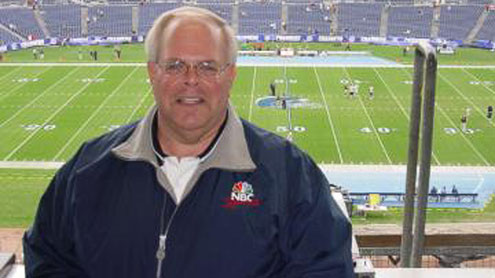The Alabama-LSU rematch in the national championship may not be popular around the nation, but Eli Gold, the Crimson Tide’s play-by-play announcer, said not only is the match-up necessary, it’s mandatory.
“As a voter, which I am not, you vote to establish who the top two teams in the country are,” Gold said. “You’re not a matchmaker. You don’t determine, ‘Yeah, it’d be great but they already played,’ or ‘The ratings won’t be as good.’ You take and reward the top two teams. There’s nobody that doesn’t think Bama and LSU are No. 1 and No. 2. They’re the best two teams. There’s no but.”
He said rematches are not unprecedented in any sport, as rematches in the Super Bowl and the World Series have happened in the past.
“If a team deserves it, whoever they are, they should be in,” said Gold, who has been broadcasting major sporting events for more than 35 years.
Originally hired as a weekend sports reporter with the Mutual Broadcasting System in 1976, Gold said he moved to Birmingham to cover the Birmingham Bulls, a team in the now-defunct World Hockey Association, and for more exposure.
After spending time as the play-by-play announcer for the UAB Blazers basketball team and Birmingham Barons, among other teams, Gold came to UA as the voice of the Crimson Tide basketball team in 1988. The next year, Gold began his run as the Crimson Tide’s play-by-play football announcer, a position he still holds today.
Gold, who hasn’t missed a UA football game since being hired in 1989, said one of his most memorable calls at UA came in 2009 when defensive lineman Terrence Cody blocked his second field goal of the game to secure an Alabama victory over Tennessee.
“I’ll blatantly say that I carried that one around with me in my Blackberry,” Gold said.
Gold said another call that many people still talk to him about is his call at the end of the game against Texas in the 2009 National Championship. After the crew spent the entire broadcast focusing on the history of UA at the Rose Bowl, Gold exclaimed, “And the roses in this grand ol’ stadium are once again Crimson,” after the final second ticked off the clock.
Despite making many of the Crimson Tide’s most infamous calls, Gold said he still doesn’t think he has “the voice.”
“My voice is distinctive, but I’m not one of these guys with a set of pipes that sound like the voice of God,” he said. “I never really thought about it, I just did what I did.”
The biggest piece of advice Gold said he could offer students looking to have a career in sports broadcasting is to practice calling live ballgames.
“There’s not a single textbook or classroom that can teach you how to broadcast a ballgame,” he said. “That’s not to say that class isn’t important, but rather to stress the need to take a tape recorder and go to ballgames and practice. That’s what I did. You can either do it or you can’t. You must go to class, but the actual act of calling the game can only be learned onsite.”
Prior to the start of the 2011 season, Gold signed a four-year contract extension to remain the football team’s play-by-play announcer through 2017.









